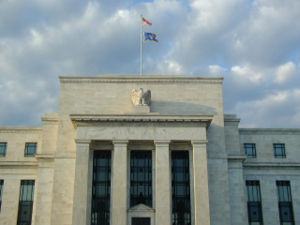Federal Reserve System: Difference between revisions
imported>Kjetil Ree |
imported>Kjetil Ree |
||
| Line 6: | Line 6: | ||
The Federal Reserve is an independent agency of the United States federal government. [[Congress]] has a supervising role, but does not interfere on a daily basis. The chairman of the Federal Reserve is reporting to Congress biannually, but it is usually working closer with The [[Department of the Treasury]] and the president. Even though The Fed has an independent status, its independence might be revoked by Congress if Congress wishes to.<ref>Tucker, Irvin B (2006) ''Survey of Economics'', page 358 Thomson South-Western, Mason, OH. ISBN 032431972</ref> | The Federal Reserve is an independent agency of the United States federal government. [[Congress]] has a supervising role, but does not interfere on a daily basis. The chairman of the Federal Reserve is reporting to Congress biannually, but it is usually working closer with The [[Department of the Treasury]] and the president. Even though The Fed has an independent status, its independence might be revoked by Congress if Congress wishes to.<ref>Tucker, Irvin B (2006) ''Survey of Economics'', page 358 Thomson South-Western, Mason, OH. ISBN 032431972</ref> | ||
The Federal Reserve System is divided into twelve districts, each district having one central bank. This unique system came as a compromise between those who wanted a strong, federal central bank and those who wanted to continue with the decentralized system in place before 1913. | The Federal Reserve System is divided into twelve districts, each district having one central bank (called a Federal Reserve Bank). This unique system came as a compromise between those who wanted a strong, federal central bank and those who wanted to continue with the decentralized system in place before 1913. | ||
The Board of Governors is administrating the system. The board is also responsible for the formulation of monetary policy, and for regulating the Federal Reserve Banks and U.S. commercial banks. | |||
==History== | ==History== | ||
Revision as of 16:34, 26 June 2007

The Federal Reserve System is the central bank of The United States. It is also known as The Federal Reserve, or more informally as The Fed. The current chairman of the Board of Governors and the Federal Reserve's leader is Ben Bernanke.
Organization
The Federal Reserve is an independent agency of the United States federal government. Congress has a supervising role, but does not interfere on a daily basis. The chairman of the Federal Reserve is reporting to Congress biannually, but it is usually working closer with The Department of the Treasury and the president. Even though The Fed has an independent status, its independence might be revoked by Congress if Congress wishes to.[1]
The Federal Reserve System is divided into twelve districts, each district having one central bank (called a Federal Reserve Bank). This unique system came as a compromise between those who wanted a strong, federal central bank and those who wanted to continue with the decentralized system in place before 1913.
The Board of Governors is administrating the system. The board is also responsible for the formulation of monetary policy, and for regulating the Federal Reserve Banks and U.S. commercial banks.
History
The Federal Reserve Banks
What a Federal Reserve Bank does
References
- Citations
- ↑ Tucker, Irvin B (2006) Survey of Economics, page 358 Thomson South-Western, Mason, OH. ISBN 032431972